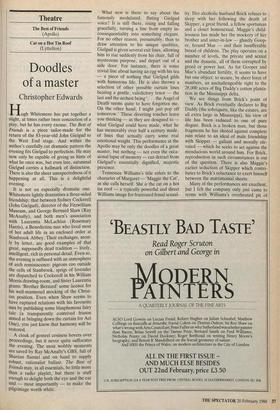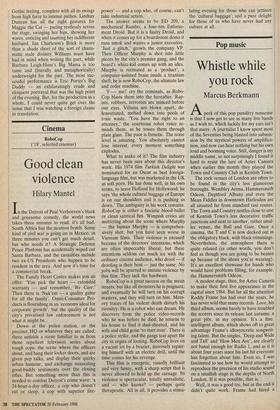Theatre
The Best of Friends (Apollo) Cat on a Hot Tin Roof (Lyttelton)
Doodles of a master
Christopher Edwards
Hugh Whitemore has put together a slight, at times rather twee concoction of a play, but he has every excuse. The Best of Friends is a piece tailor-made for the return of the 83-year-old John Gielgud to the West End stage. And within the author's carefully cut dramatic pattern the evening fits Gielgud to perfection. He may now only be capable of giving us hints of what he once was, but even late, autumnal Gielgud carries a hallmark of distinction. There is also the sheer unexpectedness of it happening at all. This is a delightful evening.
It is not an especially dramatic one. Whitemore lightly dramatises a three-sided friendship: that between Sydney Cockerell (John Gielgud), director of the Fitzwilliam Museum, and George Bernard Shaw (Ray McAnally), and both men's association with Laurentia McLachlan (Rosemary Harris), a 13enedictine nun who lived most of her adult life in an enclosed order at Stanbrook Abbey. Their exchanges, most- ly by letter, are good examples of that great, supposedly dead tradition — lively, intelligent, rich in personal detail. Even so, the evening is suffused with an atmosphere of arch reminiscence: pigeons coo outside the cells of Stanbrook, sprigs of lavender are dispatched to Cockerel] in his William Morris drawing-room, and Sister Laurentia grants 'Brother Bernard' some licence for his well-mannered mocking of the Christ- ian position. Even when Shaw seems to have ruptured relations with his favourite nun by publishing some blasphemous fairy tale (a transparently contrived frisson aimed at bringing down the curtain for Act One), you just know that harmony will be restored.
A cloak of genteel cosiness hovers over proceedings, but it never quite suffocates the evening. The most wobbly moments are saved by Ray McAnally's GBS, full of Shavian flannel and on hand to supply robust, rationalist ballast. The Best of Friends may, in all essentials, be little more than a radio playlet, but there is stuff enough to delight both the eye and the ear and — most importantly — to make the Pilgrimage worth while. What new is there to say about the famously modulated, fluting Gielgud voice? It is still there, rising and falling gracefully, turning a line from empty in- consequentiality into something elegant. For no other reason, presumably, than to draw attention to his unique qualities, Gielgud is given several exit lines, allowing him to rise suddenly from his chair, full of mysterious purpose, and depart out of a side door. For instance, there is some trivial line about having an egg with his tea — a piece of nothing that Gielgud gilds with humorous life. He is also thrown a selection of other possible curtain lines bearing a gentle, valedictory tenor — the last and the archest being . . the Angel of Death seems quite to have forgotten me. On the other hand, I might just pop off tomorrow.' These diverting touches leave you thinking — as they are designed to what Gielgud could have made, what he has memorably over half a century made, of lines that actually carry some real emotional weight. This performance at the Apollo may be only the doodles of a great master, but nothing — not even the occa- sional lapse of memory — can detract from Gielgud's essentially dignified, majestic presence.
Tennessee Williams's title refers to the character of Margaret — 'Maggie the Cat', as she calls herself. She is the cat on a hot tin roof — a typically powerful and direct Williams image for frustrated femal sexual- ity. Her alcoholic husband Brick refuses to sleep with her following the death of Skipper, a great friend, a fellow sportsman and a closet homosexual. Maggie's child- lessness has made her the mockery of her brother and sister-in-law — ghastly Goop- er, fecund Mae — and their insufferable brood of children. The play operates on a number of levels, the private and sexual and the dynastic, all of them corrupted by greed or power lust. As for Gooper and Mae's abundant fertility, it seems to have but one object: to secure, by sheer force of numbers, an unchallengeable right to the 28,000 acres of Big Daddy's cotton planta- tion in the Mississippi delta.
We see things from Brick's point of view. As Brick eventually declares to Big Daddy (the sobriquets, like the estates, are all extra large in Mississippi), his view of life has been reduced to one of pure disgust. Brick is a broken man, but those fragments he has shored against complete ruin relate to an ideal of male friendship with Skipper — gallant and morally ele- vated — which he seeks to set against the mendacious world around him. For Brick, reproduction in such circumstances is out of the question. There is also Maggie's earlier seduction of Skipper which contri- butes to Brick's reluctance to exert himself between the matrimonial sheets.
Many of the performances are excellent, but I felt the company only just came to terms with Williams's overheated pit of Gothic feeling, complete with all its swings from high farce to intense pathos. Lindsay Duncan has all the right gestures for Maggie the Cat — pacing restlessly across the stage, swinging her hips, showing her wares, enticing and taunting her indifferent husband. Ian Charleson's Brick is more than a shade short of the sort of charis- matic male divinity Williams must have had in mind when writing the part, while Barbara Leigh-Hunt's Big Mama is too tame and (literally and metaphorically) underweight for the part. The most suc- cessful performance is Eric Porter's Big Daddy — an exhilaratingly crude and eloquent portrayal that was the high point of the evening. But, for the production as a whole, I could never quite get over the sense that I was watching a foreign classic in translation.



















































 Previous page
Previous page